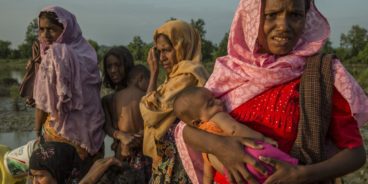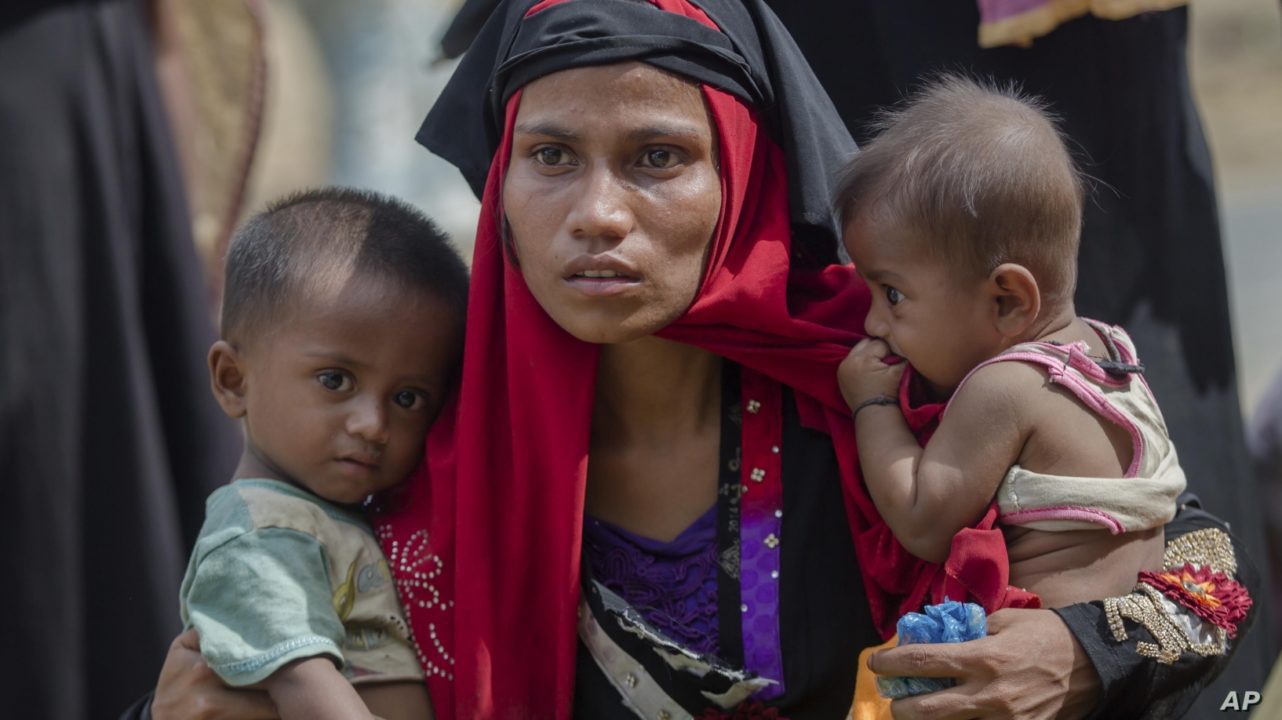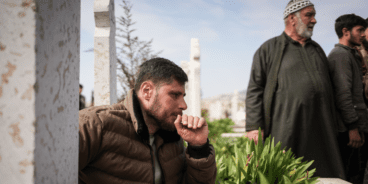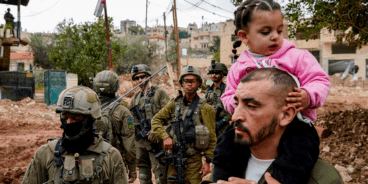

Atrocity Alert No. 168: Syria, Afghanistan, Myanmar (Burma) and Libya
Atrocity Alert is a weekly publication by the Global Centre for the Responsibility to Protect highlighting situations where populations are at risk of, or are enduring, mass atrocity crimes.
As attacks on Idlib intensify, 400,000 civilians are displaced
The military offensive by the Syrian government and their Russian allies continues against Idlib, the last opposition-held province in Syria. Over this past weekend government troops surrounded the town of Khan Shaykhun – the site of a notorious chemical weapons attack in April 2017 – forcing fighters from the armed extremist group Hayat Tahrir al-Sham to retreat and thousands of civilians to flee. Khan Shaykhun has been outside of government control since 2014.
Idlib Governorate is home to around 3 million people, many of whom have already been displaced by fighting in other parts of the country. Since the Syrian government and their Russian allies launched their offensive in April, northwest Syria has been heavily bombarded, displacing at least 400,000 people. More than 500 civilian deaths have been documented, mostly as a result of airstrikes and shelling.
There have also been at least 42 reported attacks on healthcare facilities since the offensive began. Last Wednesday, 14 August, a Syrian American Medical Society ambulance center was targeted by six airstrikes in Ma’aret Hurmeh in southern Idlib, killing two paramedics. Mark Cutts, UN Deputy Regional Humanitarian Coordinator for the Syria Crisis, condemned the attack asserting, “No one is safe. On the contrary, those who are risking everything to help some of the most vulnerable people in the world are themselves coming under attack.”
On 30 July, 10 members of the UN Security Council issued a démarche to UN Secretary-General António Guterres who subsequently created a Board of Inquiry to investigate attacks on facilities on the deconfliction list and other UN-supported facilities in northwest Syria. The inquiry will cover the period since the signing of the September 2018 demilitarized zone agreement and will investigate whether coordinates that were included on the deconfliction list – intended to ensure the protection of these facilities – were actually used to target them. Russia and the Syrian government vehemently deny targeting such facilities.
Syrian government forces and their Russian allies, as well as Hayat Tahrir al-Sham and all other armed groups, should commit to an immediate ceasefire and the full implementation of the September 2018 demilitarized zone agreement. The parties must also adhere to the provisions of Security Council Resolution 2286 (2016) regarding the protection of medical and humanitarian personnel in conflict zones.
The UN Secretary-General should make the findings of the Board of Inquiry public and identify any perpetrators responsible for grave violations of International Humanitarian Law. All those responsible for war crimes in Syria, regardless of their position or affiliation, should be held accountable for their actions.
Wedding bombing is deadliest sectarian attack in Afghanistan
At least 63 civilians were killed by a suicide bombing that targeted a wedding in Kabul on Saturday, 17 August. The armed extremist group Islamic State of Iraq and the Levant (ISIL) claimed responsibility for the attack, which was the deadliest so far this year. Tadamichi Yamamoto, UN Special Representative for Afghanistan, described the attack as “an outrage, and deeply troubling, as it can only be described as a cowardly act of terror” designed to “spread fear among the population, which has already suffered too much.”
The wedding included large numbers of guests from the Hazara ethnic community. The Taliban and ISIL have repeatedly targeted and attacked Hazaras, most of whom are Shia and are considered to be heretics by the armed extremists.
When the Taliban ruled Afghanistan from 1996-2001, they perpetrated mass killings of Hazaras in Mazar-e-Sharif in 1998 and in Bamyan province in 2000 and 2001. In recent years hundreds of Hazaras have also been killed as a result of targeted bombings, mostly claimed by ISIL. The deadliest of these attacks was a double suicide bombing in 2016 that targeted a Hazara protest rally in Kabul, killing 80 people.
Recent peace talks between the United States and the Taliban have increased insecurity among the Hazara, who are not represented at the negotiations. In the first half of 2019 the UN attributed 52 percent of all civilian casualties in Afghanistan to armed extremist groups, including the Taliban and ISIL.
The Afghan government, with support from the international community, must increase efforts to enhance civilian protection and uphold the right to freedom of religion and conscience. Any lasting peace in Afghanistan will require the involvement of representatives of vulnerable populations who have borne the brunt of the country’s long war and are targets for ongoing persecution by extremist groups – especially women and religious and ethnic minorities.
New repatriation plan as world marks Rohingya genocide anniversary
Myanmar (Burma) and Bangladesh have agreed to the repatriation of over 3,000 Rohingya refugees, with the process scheduled to start tomorrow, 22 August. A similar repatriation attempt in November 2018 failed as identified refugees refused to return to Myanmar, fearing more violence and the lack of progress on key issues, including citizenship and civil rights, as well as the lack of accountability for past atrocities.
Last week it was reported that the government of Myanmar “cleared for return” 3,450 refugees from a list of more than 22,000 provided by Bangladesh. The UN Refugee Agency (UNHCR) was tasked with surveying the refugees to determine whether they would be willing to return. According to Bangladesh’s refugee relief and repatriation commissioner, Mr. Abul Kalam, “nobody will be forced to return unless they volunteer.” So far no Rohingya refugees have agreed to repatriation.
The UN Security Council (UNSC) is discussing the repatriation plan today, 21 August, in a closed session that will include a briefing from UNHCR. On Friday, 23 August, three UNSC members – Germany, Kuwait and Peru – will also hold an Arria-formula meeting with a focus on accountability for mass atrocity crimes and other serious human rights violations in Myanmar.
This Sunday, 25 August, marks two years since security forces in Myanmar initiated so-called “clearance operations” against the Rohingya population in Rakhine State. Despite overwhelming evidence of atrocities, the UNSC has still not adopted a single resolution to name the nature of the crimes committed against the Rohingya or to hold the perpetrators accountable. The Security Council should immediately impose a comprehensive arms embargo on Myanmar and targeted sanctions on senior officers responsible for mass atrocity crimes. Individual states should also take Myanmar to the International Court of Justice for breaching its obligations under the Genocide Convention.
For more information listen to “That’s Illegal: Justice and the Genocide of the Rohingya.”
War crimes in Libya
Between 4-14 August at least 90 civilians were killed and over 6,400 displaced due to fighting in the south-western city of Murzuq in Libya. Over 3,000 more were displaced by clashes on 17 and 18 August. Fighting intensified after a 4 August airstrike on a townhall meeting that killed 43 civilians and was carried out by the so-called Libyan National Army (LNA), led by self-appointed Field Marshal Khalifa Haftar. The LNA claimed that it was targeting “Chadian opposition fighters” – terminology frequently used to describe ethnic Tebu fighters who operate in the area. According to the UN Office for the Coordination of Humanitarian Affairs (OCHA), families remain trapped by fighting in Murzuq and fear reprisals if they flee.
Since the beginning of an LNA offensive against the UN-backed government in Tripoli on 4 April, over 100 civilians have been killed and more than 100,000 displaced. The UN Support Mission in Libya (UNSMIL) has reported more than 37 attacks on healthcare facilities since April and stated that intentionally targeting health workers and facilities “is a war crime, and when committed as part of a widespread or systematic attacks directed against any civilian population, may constitute a crime against humanity.”
The UN Security Council should impose targeted sanctions against all individuals and political forces trying to militarily overthrow the UN-backed government and subvert the peace process, especially Haftar and the LNA. All armed groups need to uphold their obligations under International Humanitarian Law and recommit to a lasting ceasefire and political solution.
Read Next

Related Publications

Populations at Risk, March 2025

Atrocity Alert No. 430: Syria, Central African Republic and the Philippines
